 |
| Download pdf file | Newsletter archives |
| Dieser Newsletter auf Deutsch | Cette newsletter en français |
1. First step towards revision of the EWC Directive |
 |
|
European Commission invites comments from social partners
The consultation document lists problems related to the following aspects:
The European Commission asked the following questions to unions and employers' organisations:
1) Do you consider that the issues are correctly listed? 2) Do you consider that action is needed to address the problems? If so, what should be the focus and scope of these measures? 3) Would you consider drafting the text of a new EWC Directive as a joint proposal of social partners? European Commission press release Full text of the consultation document Radio broadcast from Deutschlandfunk The trade union response
The ETUC Action Programme for 2023 to 2027 The employer organisations' response
Instead of amending the law, the employer’s confederation proposes a “code of practice” to clarify some unclear terms in the directive, e.g. the transnational competence of the EWC, the scope of information, or the timeframe for consultation procedures. In particular, they reject any administrative or judicial orders that could freeze or delay the decision-making of companies. Disproportionately high penalties would lead to the undermining of mutual trust. Possible sanctions should be defined exclusively by member states and not by the EU, which is also a demand made by right-wing parties within the European Parliament. BusinessEurope supports infringement proceedings against individual countries if they are necessary. At the moment such proceedings are ongoing against Ireland (see report in EWC News 2/2022).
Video conferences should be legally regulated
Neither the European Parliament nor the European Commission mention video conferencing for the EWC in their proposals. BusinessEurope notes that more flexibility should be offered to companies and EWC members to limit costs and make good use of the opportunities for digital communication. The employer organisations are open to negotiating with unions on changes to the directive if the second stage consultation by the European Commission provides “a balanced basis for negotiations”.
Employer confederations' official response The next steps
After evaluating these responses, the European Commission will launch the second consultation phase with the social partners after the summer break. The timetable is tight, as the draft of the new directive is scheduled to be available before the end of the year. It must also ensure that the principles of subsidiarity, proportionality and improvement of legislation are respected and that companies are not unnecessarily burdened. The conclusion of the legislative process will then fall within the term of office of the new Commission after the European elections in June 2024.
Forthcoming event
The current status of the revision procedure will be discussed at the next EWC conference on 29 and 30 January 2024 in Hamburg. The exact programme will be available after the summer break. |
2. Developments at European level |
 |
|
Pay Transparency Directive adopted
The directive came into force on 7 June 2023 and must be transposed into national law by member states within three years. All companies with more than 100 employees must then make their pay structures more transparent. If the pay gap exceeds 5%, a pay assessment must be carried out with employee representatives and an action plan for equality must be drawn up. Every employee is then allowed to access statistical data on salaries broken down by gender to uncover a possible pay gap. The directive goes far beyond the German law adopted in 2017 and also provides for sanctions; compensation, reversal of the burden of proof and fines for non-compliance. The legislative process for the directive had started in March 2021 (see report in EWC News 1/2021). In Germany, the Federal Labour Court ruled on a pay discrimination case in February 2023 (see report in EWC News 1/2023).
Report on the vote in the European Parliament Report on the contents of the Directive Current figures on the pay gap in the EU Sweden joins the legal action against the Minimum Wage Directive
Press report on the Swedish government's decision Report on the European Trade Union Confederation Congress Global Due Diligence Directive on the home straight
The European Parliament formulated more ambitious goals than the European Commission. For example, due diligence would apply to all companies with 250 or more employees and a turnover of €40 million (instead of 500 employees and a turnover of €150 million). MEPs also want to include financial service providers. All companies would have to draw up a plan on how to reduce their greenhouse gas emissions. This plan would have to be agreed with employee representatives, and European works councils could also play a role here. The performance-related variable remuneration of board members of companies with 1,000 or more employees should take this into account. Non-compliance with the directive would result in fines of up to 5% of global turnover. The final legislative text will be negotiated in the trialogue (Parliament, Commission, Council of Ministers) in the coming weeks so that the Directive can be adopted before the end of the year.
Report on the vote in the European Parliament Background information on the topic
Forthcoming event
In Germany, the Supply Chain Due Diligence Act came into force on 1 January 2023 (see report in EWC News 1/2023), which may have to be reinforced due to the EU Directive. A seminar on this topic will be held in Bremerhaven, Germany, on 16 and 17 November 2023.
|
3. Compliant implementation of EU directives in Germany? |
 |
|
Federal Labour Court reinforces codetermination in the SE Directive
This was the first time that a valid SE employee participation agreement has been partially overruled by a court decision. Previously, the European Court of Justice had ruled on 18 October 2022 that the prerogatives of (external) trade unions may not be restricted in the case of an SE conversion (see report in EWC News 4/2022). The ruling is significant over and above this specific case since SE conversions are used by many companies to weaken or completely avoid codetermination on the supervisory board. Unions and Hans Böckler Foundation are therefore calling for legal initiatives from the German government, as provided for in the coalition agreement (see report in EWC News 4/2021).
Hans Böckler Foundation press release
Further ongoing legal disputes on the SE
A second case on SE codetermination has been pending before the European Court of Justice since May 2022. It concerns the Japanese optics and photography group Olympus (see report in EWC News 2/2022). A third case involving the family-owned company Brose Fahrzeugteile from Coburg (see report in EWC News 3/2022) is on its way to the Federal Labour Court. Unequal pay through collective agreement compatible with EU law
In December 2022, the European Court of Justice ruled that temporary agency workers may be paid less than permanent staff, but must be adequately compensated to ensure “overall protection” (see report in EWC News 1/2023). This ruling from Luxembourg gave the impression that unequal treatment would hardly be possible. However, the Federal Labour Court has dashed this hope. Current collective agreements in temporary agency work would not contradict the EU Directive. It allows exceptions to the principle of equal treatment if temporary workers have a permanent employment contract, are paid in periods between assignments and a collective agreement allows for lower pay.
Federal Labour Court press release German whistleblower protection law comes into force after delay
The new law obliges all companies with 50 or more employees to set up channels for the confidential reporting of legal violations. Those who uncover corruption, tax fraud or violations of environmental standards are then protected from reprisals. For the German Trade Union Confederation (DGB), the law partly violates European law because it prescribes the internal reporting channel as a matter of principle, does not provide for compensation for whistleblowers and makes it more difficult to reverse the burden of proof.
Report on the contents of the law Trade union guide for whistleblowers |
4. EWC law in Ireland |
 |
|
Court ruling jeopardizes the functioning of the EWC
Verizon's central management is deliberately and regularly infringing the rights of the EWC and is attempting to obstruct its work. Prior to moving its legal headquarters to Ireland, in October 2020, Verizon was forced to pay a fine of £40,000 in the UK, the highest ever imposed in an EWC matter in the whole of Europe (see report in EWC News 3/2020). With Brexit, it has further intensified its obstructive attitude, as there is no jurisdiction in Ireland and Irish EWC law is considered deficient. Since May 2022, the European Commission has therefore been pursuing infringement proceedings against Ireland (see report in EWC News 2/2022). In February 2023 a hearing was held in the Irish Parliament (see report in EWC News 1/2023). The complaint filed at the WRC dealt with three issues:
1. To what training are EWC members entitled to? The WRC rejected the claim for reimbursement of costs incurred by four EWC members who attended the EWC Academy seminar in Hamburg in September 2021 (see report in EWC News 3/2021). This was the first training event requested by the EWC in its current term of office. Shortly before, central management had organised a training session delivered by an employer-friendly law firm on its own initiative and without consulting the EWC. This was reason enough for the WRC to deny the EWC members the right to training of their own choice. Should the decision become legally binding, it would put the EWC's ability to function as a representative body independent of the employer, seriously at risk.
2. The payment of experts The WRC decided to cut the approved cost of invoices for consultancy by 50% across the board without specifying which hours would be recognised and which would not. If the decision becomes final, the EWC will have to pay several thousand €s from a non-existent fund, which is contrary to the objectives of the EU Directive. The WRC hereby (surely unintentionally) confirms the European Commission's reservations that there is insufficient access to experts in Ireland. The reduction of EWC consultancy reimbursements by 50% has never been seen before in court decisions in any other EU country. In the UK, the payment of experts was fundamentally clarified for the first time in January 2016 (see report in EWC News 1/2016). This clarification is still pending in Ireland. Due to its fundamental importance, an appeal against the court rulings on points 1. and 2. was filed before the Labour Court on 23 May 2023.
3. Unlawful discrimination against an EWC member The WRC awarded a Czech EWC member compensation of €4,000 because he had been personally subject to reprisals by management for attending the Hamburg conference. However, this represents only the tip of the iceberg when it comes to the methods used by Verizon management against a works council which rightly considers itself as a body representing the employees and not as a sub-committee directed by management. The decision on point 3. is final.
Press report on the court rulings Commentary by the employer's law firm Discussion with experts on Irish EWC law
The meeting covered the basics of the Irish industrial relations system, the role of the Workplace Relations Commission (WRC) and the Labour Court as well as the rules of arbitration in EWC matters. The peculiarity in Ireland is that neither the WRC, as a first instance body, nor the Labour Court as an appeal body are an official part of the judicial system. No one (not even the chairperson of the Labour Court) is required to have any legal qualifications, training or experience. Both instances are part of the administration of justice, but their decisions cannot be enforced. Only the District Courts have the power to do so, and an action for enforcement must be brought before them. Labour Court decisions can be appealed to the High Court, but only on “points of law”. Proceedings in the High Court cannot be conducted by ordinary lawyers, but additionally require the appointment of a barrister, a special profession for the higher courts. This can result in costs of over €100,000. So far it has not been clarified in Ireland who would bear such costs for the EWC.
Long duration of proceedings already in the first instance
A new study on the Workplace Relations Commission in March 2023 found that on average 14 months elapse between the filing of a complaint and the date of the first hearing. After the oral hearing, plaintiffs then have to wait almost another five months for the decision. In the calendar year 2022, the situation improved significantly: the delay until the oral hearing was reduced to four months and the judgment was delivered after another nine weeks. The WRC is a relatively young institution, founded in October 2015 (see report in EWC News 2/2015). |
5. Investments in semiconductors and electromobility |
 |
|
Gigantic investment in chip manufacturing in Europe
Contracts for the construction of the two new chip factories in Magdeburg (“Silicon Junction”) were signed on 19 June 2023, with construction starting at the end of 2023 and production due to start in 2027. This represents, for a total of €30 billion, the largest single investment by a foreign company in German history. In addition to 3,000 high-tech jobs, 7,000 new jobs with suppliers are expected. The total amount of investment is much higher than the construction of Tesla's Gigafactory near Berlin. In the long term, the two chip factories in Magdeburg could be supplemented by an additional six. Intel has already secured corresponding options. The new factory construction in Wrocław also has a huge dimension, since, for a total of €4.6 billion it represents the largest foreign investment in Poland's history. More than 2,000 highly qualified jobs are to be created by 2027, plus thousands more jobs with suppliers.
Press report on the investment in Germany Press report on the investment in Poland
Intel has 130,000 employees worldwide and has had a European works council in place since 1996. It is a joint body of employer and employee representatives based on a “voluntary” agreement, not yet subject to the EU Directive (Intel European Employee Forum). Although the European headquarters are in Munich, the EWC operates under Luxembourg jurisdiction. Given the scale of the new factories in Germany, the question will eventually arise whether Intel will accept German codetermination on the supervisory board. The US company Tesla had set up a European Company (SE) in good time before the start of construction of its new car factory near Berlin in order to keep the supervisory board free of employee representatives (see report in EWC News 4/2019). IG Metall union was also disadvantaged in the establishment of the works council at the new Tesla factory.
Press report on the Tesla works council Electromobility: largest investments in Hungarian history
Until now, Samsung and the SK Group from South Korea have been the biggest investors in e-mobility, but for some months now, construction has been underway in Debrecen in the east of the country near the Romanian border. The world's most modern plant is being built there at a cost of €2 billion, where BMW will produce exclusively all-electric vehicles from 2025. In the neighbourhood, the Chinese company CATL is building one of the largest battery factories in Europe on an area of 280 football pitches with an annual capacity of 100 gigawatt hours (GWh) for one million electric cars. A study published in February 2023 by the Budapest branch of the Friedrich Ebert Foundation looks at the development of the industry in Hungary and the challenges for trade unions. Hungarian trade unions are progressively taking on an important role in the restructuring of the European industrial society and in safeguarding social standards.
Press report on the new factory Industrial relations and trade unions in Hungary |
6. Nationalisation of care group brings an end to union busting |
 |
|
Rough management tactics to increase profits
Orpea has a real estate portfolio of €7.4 billion, which was built up using public money and income from old people's homes. According to an investigation by the CGT and CFDT trade unions, this was achieved through tax havens, in particular in Luxembourg and the British Virgin Islands. Later, the real estate assets were to be resold, meaning higher rents for old people's homes without reducing debt. Orpea's entire business model is at the expense of staff, salaries and quality of care - according to the unions.
Investigative journalist exposes the scandal
Orpea's downfall began on 24 January 2022 with a sudden drop in its share price after a book entitled “Les Fossoyeurs” (the gravediggers) exposed abuse and malpractice. Orpea had previously sought to pay the author €15 million to refrain from publishing it. A few days later, the CEO resigned. He is now under investigation for tax evasion, money laundering and insider trading. An investigation by the social security authorities in March 2022 found serious irregularities in the old people's homes, leading to the repayment of €56 million in state subsidies misappropriated by Orpea.
Pressure on works council members and spying
Such business practices inevitably lead to conflict with worker representatives. Before nationalisation, the management at the time had attracted attention for its anti-union behaviour. In France, employee representatives of the CGT union were spied on and in Belgium there were strikes over understaffing. The German hospital group Celenus, owned by Orpea, engaged in a years-long dispute with the ver.di union. Almost 70 lawsuits were brought against the EWC chairwoman from Bremen within two years. The Bremen Regional Labour Court recently awarded her €15,000 in damages for discrimination and workplace mobbing. It is not surprising that negotiations on the creation of a European works council also failed (see report in EWC News 4/2020).
The new management is now trying to deal fairly with employee representatives. All lawsuits against the EWC chairwoman have been withdrawn and the works council elections in France were organised correctly. A court had annulled the last elections on the grounds of manipulation and fraud. In Poland, collective bargaining is underway for the first time for all sites, which the former management had strongly opposed. However, the Orpea example highlights a fundamental problem: the negative impact of private sector concepts within the care sector. Two union federations presented an international analysis on this issue on 24 April 2023.
Detailed documentation of the events Report on the new management strategy Report on the German EWC chairwoman Report on collective bargaining in Poland Summary and download of the international analysis |
7. New EWC agreements |
 |
|
EWC remains in place on the basis of SE agreement
The negotiated agreement nevertheless applies to the European works council, which was established in 2008. It consists of 24 members from 16 EU countries, six from France and two each from Germany, Spain and Italy. The chair is held by the employer, the employee representatives elect a secretary, who must come from the largest country (France), and a select committee of another three members. Ordinary EWC meetings are held three times a year.
There are also extraordinary meetings when at least 2% of the respective workforce in two countries are affected by a measure. This threshold is relatively low as no country outside France has more than 300 employees. As is common in France, expert support is widely available. A second meeting is held one month after the extraordinary meeting to discuss the EWC's opinion, which must be sent no later than 15 days afterwards. Opinions are always discussed in a plenary session, not in the select committee - a typical feature of SE agreements.
Full text of the EWC agreement Indian IT company establishes EWC under Irish law
The annual EWC meetings are co-chaired by the elected EWC chair and central management. In between, the five members of the select committee meet with central management three times a year. In addition, extraordinary meetings are held if at least 50 employees in each of two countries are affected by a planned measure. In these cases, the timetable is negotiated first, but the consultation procedure should normally last no longer than one month. Opinions may only be given by the select committee if it has been authorised to do so by the EWC. Documents shall be provided in English and shall only be translated into the national language of an EWC member upon written request.
Each delegate has 24 hours time-off work per year in addition to time for meetings, select committee members have 60. In addition, there is an entitlement to four days training per term of office and introduction training at the first EWC meeting. The rules on confidentiality are much stricter than in the Irish EWC law. The EWC can call in two experts, one of whom is paid by the company. They may attend meetings with management but may only speak if management agrees. Internal arbitration is provided for in the event of disagreements. If no agreement is reached within three weeks, the matter can be referred to the Workplace Relations Commission. If the EWC agreement is terminated and no new agreement signed within two years, subsidiary requirements of the Irish EWC Act automatically apply.
Three other Indian companies with EWCs so far
For many years, two steel companies headquartered in India have had a European works council: ArcelorMittal under Luxembourg jurisdiction and Tata Steel under German law. For the steel and aluminium plants of the Gupta Family Group Alliance (GFG Alliance), an EWC under Czech law was established in November 2021 (see report in EWC News 1/2022). |
8. Recent SE conversions |
 |
|
Tight deadlines for consultation procedures
The SE works council has eleven members who meet once a year for a face-to-face meeting. Two external trade union officers may attend. The five-member steering committee may hold two internal face-to-face meetings per year. Decisions may also be taken by telephone or video conference. In the case of restructuring, an extraordinary information and consultation procedure is carried out if at least 35 employees in a single country or more than 20 in two countries are affected. The SE works council must render its opinion within two business days. If central management does not want to follow its proposals, it may request an extraordinary meeting within a further business day with a view to reaching an agreement. The SE works council has a right of access in all countries without employee representation. All other features of the SE participation agreement, which was signed on 19 January 2023, are aligned with the standard rules of the legislation.
Full text of the conversion plan Press release on the SE conversion No board-level codetermination, but extensive rights for SE works council
While many features of the agreement text are aligned with the standard rules of the SE Directive, the competences of the SE works council go beyond them. It can initiate consultation procedures on the following topics: data processing, occupational health and safety, education and training, equal opportunities, and environmental protection. It can also establish sub-committees to carry out tasks independently. However, the meetings of the sub-committees take place online. One of the two annual meetings of the SE works council, may be held abroad. It has the right to hold a third meeting per year by video conference without the participation of central management. A coordinator from IG Metall union shall attend all meetings of the SE works council and the steering committee. The members of the SE works council have a right of access to all European locations, but there is no reimbursement of travel expenses and no time-off work for this.
Press release on the SE conversion Dormant SE works council and freezing of codetermination on the supervisory board
For the time being an SE works council will not be established (“temporary dormant”) because there are supposedly no cross-border issues within the SE. However, it can be activated at any time at the request of a large country and returned to dormancy by a simple majority. It has a maximum of eleven members, with small countries not automatically receiving a mandate. It holds up to three meetings a year, which can take place as a video conference with the approval of the chair. All other features are closely aligned with the standard rules of the law.
Press report on the SE conversion |
9. The view beyond Europe |
 |
|
Siemens works council members visit the USA
Union busting violates ILO standards
Automobile industry in Africa - a sleeping giant
On 16 June 2023, the Friedrich Ebert Foundation's Trade Union Competence Centre for Sub-Saharan Africa, based in Johannesburg, published a study on the automotive industry, industrial relations and occupational health and safety in three countries: South Africa, Ghana and Kenya. The research team explains how the new German Supply Chain Due Diligence Act can contribute to upholding social standards in Africa's automotive industry. The study describes the current debate in German car manufacturing groups, role of works councils and trade unions and pleads for the creation of a trade union network between Germany and Africa.
Despite 1.4 billion inhabitants, almost a fifth of the world's population, Africa accounts for a mere 1% of global car purchases. In 2021, 1.1 million new vehicles were sold. South Africa, Egypt and Morocco are the largest markets with the bulk of manufacturing. However, by 2035, 5 million new vehicles are expected to be sold in Africa. The first automotive cluster in West Africa is being created in Ghana. Electromobility is also on the rise, especially in East Africa. The development could run a similar course to that of telephones: due to the fact that there were hardly any fixed-network connections in Africa, the breakthrough of mobile phones has been all the faster.
Report on the work of the Competence Centre Report on electromobility in East Africa |
10. Interesting websites |
 |
|
Have you been treated unfairly?
Overview of national equality bodies Examples of the work of equality bodies Safe and healthy working environment in the digital age
The second section on European topics Reports on the working world in Switzerland
The first section on European topics The second section on European topics Worldwide commitment to living wages in the textile industry
Overview of the work of the ACT Foundation |
11. New publications |
 |
|
Why is there no board-level employee participation in Belgium?
More information on the working paper Inflation favours industrial action in Germany and Europe
Overview of the Hans Böckler Foundation report The ETUI European report (from page 92) Guide for EWC litigation
Further information and download of all language versions The voice of workers in global supply chains
Further information on the volume |
12. The EWC Academy: examples of our work |
 |
|
Training at face-to-face EWC meeting in Switzerland
EWC and SE introductory seminar at Montabaur Castle
EWC training for US pharmaceutics group under Irish law
|
13. Current seminar schedule |
 |
|
The EWC Academy and its forerunner organisation have been holding conferences and seminars for the members of European works councils, SE works councils and special negotiating bodies since January 2009. So far, 906 employee representatives from 308 companies have taken part including many of them more than once. This represents around 25% of all transnational works council bodies in Europe. In addition, there are numerous in-house events and guest lectures for other organizations.
Overview of the forthcoming seminar dates Legal issues of EWC and SE work
Seminar on data protection and the Supply Chain Due Diligence Act
16th Hamburg Conference for European and SE Works Councils
EWC and SE seminar at Montabaur Castle
Report from the last seminar in Montabaur In-house events
|
14. Imprint |
 |
|
EWC News is published by:
|
 |
 On 11 April 2023, the first phase of consultations on the revision of the European works council Directive was launched. The legislative process is due to officially start before the end of 2023, preceded by a two-stage consultation of social partners. Should unions and employers' organisations manage to negotiate and jointly present a draft, it could be enacted as a new EWC Directive. The consultation follows a European Parliament resolution of 2 February 2023 calling for concrete directive changes (see
On 11 April 2023, the first phase of consultations on the revision of the European works council Directive was launched. The legislative process is due to officially start before the end of 2023, preceded by a two-stage consultation of social partners. Should unions and employers' organisations manage to negotiate and jointly present a draft, it could be enacted as a new EWC Directive. The consultation follows a European Parliament resolution of 2 February 2023 calling for concrete directive changes (see 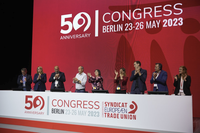
 On 25 May 2023, BusinessEurope, the European confederation of employer organisations, published its response. Like before, it rejects any change to the directive on the grounds that trust between the parties cannot be enforced by law. The problems identified by the European Commission are more practical than legal and would not be addressed by a revision of the directive. The low number of court cases demonstrates that most European works councils operate satisfactorily.
On 25 May 2023, BusinessEurope, the European confederation of employer organisations, published its response. Like before, it rejects any change to the directive on the grounds that trust between the parties cannot be enforced by law. The problems identified by the European Commission are more practical than legal and would not be addressed by a revision of the directive. The low number of court cases demonstrates that most European works councils operate satisfactorily.
 On 30 March 2023, the European Parliament voted by a large majority, with 427 votes in favour, 79 against and 76 abstentions, to adopt the new Pay Transparency Directive, which aims to reduce the gender pay gap in the EU. In 2021, women in the EU received on average 12.7% less pay than men, with large differences between countries: in Luxembourg there is no longer any pay gap, whereas in Estonia it is 20.5%. Germany has quite a high figure of 17.6%, about as much as in the USA.
On 30 March 2023, the European Parliament voted by a large majority, with 427 votes in favour, 79 against and 76 abstentions, to adopt the new Pay Transparency Directive, which aims to reduce the gender pay gap in the EU. In 2021, women in the EU received on average 12.7% less pay than men, with large differences between countries: in Luxembourg there is no longer any pay gap, whereas in Estonia it is 20.5%. Germany has quite a high figure of 17.6%, about as much as in the USA. On 27 April 2023, the Swedish government announced that it will join the action for annulment of the EU Minimum Wage Directive before the European Court of Justice. The legal suit was initially filed before the court by the Danish government on 18 January 2023 (see
On 27 April 2023, the Swedish government announced that it will join the action for annulment of the EU Minimum Wage Directive before the European Court of Justice. The legal suit was initially filed before the court by the Danish government on 18 January 2023 (see 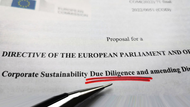 On 1 June 2023, the European Parliament adopted its position on the content of the Due Diligence Directive by 366 votes in favour, 225 against and 38 abstentions. The draft of this directive, which holds companies accountable for violations of human rights and environmental standards throughout the supply chain, has been available since February 2022 (see
On 1 June 2023, the European Parliament adopted its position on the content of the Due Diligence Directive by 366 votes in favour, 225 against and 38 abstentions. The draft of this directive, which holds companies accountable for violations of human rights and environmental standards throughout the supply chain, has been available since February 2022 (see  On 23 March 2023, the first legal dispute in history on supervisory board codetermination in companies with the legal form of a European Company (SE) came to an end. After more than seven years, the trade unions ver.di and IG Metall succeeded in convincing the Federal Labour Court to order the software company SAP to change the composition of its supervisory board. The judges ordered that the reduction of the supervisory board from 18 to twelve members be reversed and that the unions be allowed to keep their guaranteed seats as in a German supervisory board.
On 23 March 2023, the first legal dispute in history on supervisory board codetermination in companies with the legal form of a European Company (SE) came to an end. After more than seven years, the trade unions ver.di and IG Metall succeeded in convincing the Federal Labour Court to order the software company SAP to change the composition of its supervisory board. The judges ordered that the reduction of the supervisory board from 18 to twelve members be reversed and that the unions be allowed to keep their guaranteed seats as in a German supervisory board. On 31 May 2023, the Federal Labour Court confirmed the common practice that temporary agency workers may be paid less than the permanent workforce in the hiring company. On average, the 800,000 temporary agency workers in Germany (2% of all employment relationships) receive €600 less per month. According to the judges, this is not legally objectionable if the unequal treatment is compensated for in a different manner in the collective agreement. Such compensation is, for example, the legal right to continued payment of wages during non-working periods, which does not exist in other countries.
On 31 May 2023, the Federal Labour Court confirmed the common practice that temporary agency workers may be paid less than the permanent workforce in the hiring company. On average, the 800,000 temporary agency workers in Germany (2% of all employment relationships) receive €600 less per month. According to the judges, this is not legally objectionable if the unequal treatment is compensated for in a different manner in the collective agreement. Such compensation is, for example, the legal right to continued payment of wages during non-working periods, which does not exist in other countries. On 2 July 2023, the EU Whistleblower Directive was transposed in Germany after a delay of one and a half years. Six other EU countries are also behind schedule, which is why the European Commission has filed a complaint before the European Court of Justice. The reason for the delay initially had been disagreements within the Grand Coalition and on 10 February 2023, the German Federal Council (Bundesrat) had stopped the new government's bill. The directive came into force in December 2019 and set a two-year transposition period (see
On 2 July 2023, the EU Whistleblower Directive was transposed in Germany after a delay of one and a half years. Six other EU countries are also behind schedule, which is why the European Commission has filed a complaint before the European Court of Justice. The reason for the delay initially had been disagreements within the Grand Coalition and on 10 February 2023, the German Federal Council (Bundesrat) had stopped the new government's bill. The directive came into force in December 2019 and set a two-year transposition period (see 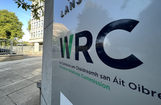 On 14 April 2023, the Workplace Relations Commission (WRC) announced the first ever decision in an EWC dispute in Irish history. The WRC acts as a court of first instance in disputes arising under TICEA, the Irish EWC Act, but has fewer powers than the UK Central Arbitration Committee (CAC). Four EWC members of the US telecommunications group Verizon had filed a complaint since a works council as a collective body does not have the legal capacity to file a complaint in Ireland. The Verizon EWC operates under the subsidiary requirements and is advised by the EWC Academy (see
On 14 April 2023, the Workplace Relations Commission (WRC) announced the first ever decision in an EWC dispute in Irish history. The WRC acts as a court of first instance in disputes arising under TICEA, the Irish EWC Act, but has fewer powers than the UK Central Arbitration Committee (CAC). Four EWC members of the US telecommunications group Verizon had filed a complaint since a works council as a collective body does not have the legal capacity to file a complaint in Ireland. The Verizon EWC operates under the subsidiary requirements and is advised by the EWC Academy (see  The first EWC Academy meeting to be held in Dublin took place from 29 to 31 March 2023 (photo shows some participants visiting the historic Guinness Storehouse). The event followed on from the six previous conferences held in London and follows the shift of numerous European works councils from British to Irish law (see
The first EWC Academy meeting to be held in Dublin took place from 29 to 31 March 2023 (photo shows some participants visiting the historic Guinness Storehouse). The event followed on from the six previous conferences held in London and follows the shift of numerous European works councils from British to Irish law (see  The US semiconductor manufacturer Intel, which has a global market share of 80% in microprocessors for PCs, will invest €80 billion in Europe to tackle supply chain problems. A fully integrated value chain for semiconductor production is to be created in Europe to act as a counterbalance to locations in the USA and Asia. Two new giga-factories are being built in Magdeburg, eastern Germany, a new centre for research and development in France and a large factory in Poland in Wrocław, where microprocessors will be assembled and tested. Manufacturing in Ireland, Italy and Spain is also being expanded.
The US semiconductor manufacturer Intel, which has a global market share of 80% in microprocessors for PCs, will invest €80 billion in Europe to tackle supply chain problems. A fully integrated value chain for semiconductor production is to be created in Europe to act as a counterbalance to locations in the USA and Asia. Two new giga-factories are being built in Magdeburg, eastern Germany, a new centre for research and development in France and a large factory in Poland in Wrocław, where microprocessors will be assembled and tested. Manufacturing in Ireland, Italy and Spain is also being expanded.
 On 1 February 2023, the state-owned bank Caisse des Dépôts acquired a majority of the capital of the French care group Orpea, which has 72,000 employees in 23 countries. Its debt at that time was €9.5 billion. Then, on 12 May 2023, a loss of €4 billion was announced for the 2022 financial year, compared to a profit of €65 million the year before. Restructuring of the group at the European level is now inevitable.
On 1 February 2023, the state-owned bank Caisse des Dépôts acquired a majority of the capital of the French care group Orpea, which has 72,000 employees in 23 countries. Its debt at that time was €9.5 billion. Then, on 12 May 2023, a loss of €4 billion was announced for the 2022 financial year, compared to a profit of €65 million the year before. Restructuring of the group at the European level is now inevitable. On 16 January 2023, a revised EWC agreement was signed at the headquarters of bioMérieux in Marcy-l'Étoile (near Lyon). The family-owned company provides diagnostic solutions (reagents, equipment, software and service) and has 11,000 employees worldwide, including 4,000 in France. In the course of a planned SE conversion, a special negotiating body was established to negotiate an SE agreement. However, after the negotiations were concluded, central management cancelled the SE conversion.
On 16 January 2023, a revised EWC agreement was signed at the headquarters of bioMérieux in Marcy-l'Étoile (near Lyon). The family-owned company provides diagnostic solutions (reagents, equipment, software and service) and has 11,000 employees worldwide, including 4,000 in France. In the course of a planned SE conversion, a special negotiating body was established to negotiate an SE agreement. However, after the negotiations were concluded, central management cancelled the SE conversion. On 22 March 2023, the European works council of Wipru held its constituent meeting in Dublin. The IT and outsourcing company, based in the Indian IT metropolis of Bengaluru, has 250,000 employees, of which 30,000 are in Europe. In the new EWC, 15 delegates represent 5,900 employees in 18 EU countries and Norway. The UK with 10,000 employees and Switzerland are not included. Although Romania is the largest EU country with 1,800 employees, the EWC is based in Ireland, where there are only 400. There is not yet a single EWC under Romanian jurisdiction. The second largest country is Germany with 1,200 employees, where the EWC agreement was signed on 15 September 2022 in Frankfurt am Main.
On 22 March 2023, the European works council of Wipru held its constituent meeting in Dublin. The IT and outsourcing company, based in the Indian IT metropolis of Bengaluru, has 250,000 employees, of which 30,000 are in Europe. In the new EWC, 15 delegates represent 5,900 employees in 18 EU countries and Norway. The UK with 10,000 employees and Switzerland are not included. Although Romania is the largest EU country with 1,800 employees, the EWC is based in Ireland, where there are only 400. There is not yet a single EWC under Romanian jurisdiction. The second largest country is Germany with 1,200 employees, where the EWC agreement was signed on 15 September 2022 in Frankfurt am Main. TeamViewer became a European Company (SE) on 15 March 2023. The software company, based in Göppingen, has 1,400 employees (incl. 600 from outside Germany) and specialises in digital networking of computers, mobile phones, industrial machines and robots. Through the SE conversion the company could ensure that shareholders remain among themselves on the supervisory board. Codetermination has been permanently excluded.
TeamViewer became a European Company (SE) on 15 March 2023. The software company, based in Göppingen, has 1,400 employees (incl. 600 from outside Germany) and specialises in digital networking of computers, mobile phones, industrial machines and robots. Through the SE conversion the company could ensure that shareholders remain among themselves on the supervisory board. Codetermination has been permanently excluded. Since 20 March 2023, the listed company Jost Werke in Neu Isenburg (near Frankfurt) has been operating as a European Company (SE). The manufacturer of systems for commercial vehicles has 900 employees in Germany and no employee representatives on the supervisory board. This will remain the case in the future; the SE involvement agreement of 11 November 2022 does not contain an article concerning the supervisory board. The future SE works council represents 2,300 employees in twelve countries (including Britain). Four out of a total of 14 seats are for Germany and two each for Poland, Sweden and Hungary.
Since 20 March 2023, the listed company Jost Werke in Neu Isenburg (near Frankfurt) has been operating as a European Company (SE). The manufacturer of systems for commercial vehicles has 900 employees in Germany and no employee representatives on the supervisory board. This will remain the case in the future; the SE involvement agreement of 11 November 2022 does not contain an article concerning the supervisory board. The future SE works council represents 2,300 employees in twelve countries (including Britain). Four out of a total of 14 seats are for Germany and two each for Poland, Sweden and Hungary.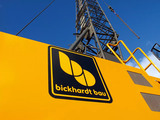 Since 18 April 2023, Bickhardt Bau in Kirchheim (Hesse) has been operating as a European Company (SE). With just 1,887 employees in Germany, one-third board-level employee participation could be secured shortly before the 2,000 threshold was reached, and hereby full-parity codetermination permanently excluded. There is currently a presence abroad only in Poland with 61 workers. The SE participation agreement concluded on 17 October 2022 after barely three weeks of negotiations, grants the worker representatives two of the six supervisory board seats.
Since 18 April 2023, Bickhardt Bau in Kirchheim (Hesse) has been operating as a European Company (SE). With just 1,887 employees in Germany, one-third board-level employee participation could be secured shortly before the 2,000 threshold was reached, and hereby full-parity codetermination permanently excluded. There is currently a presence abroad only in Poland with 61 workers. The SE participation agreement concluded on 17 October 2022 after barely three weeks of negotiations, grants the worker representatives two of the six supervisory board seats. Once a year, six unions represented at Siemens in the USA and Canada meet for an exchange of experience and to be informed by North American management on the business situation and employment trends. A delegation from European works councils of Siemens and Siemens Energy also participated in the last meeting held on 12 and 13 April 2023 in Chicago. Together with the unions in the USA, they are seeking to promote recognition of local employee representation and to prevent union busting.
Once a year, six unions represented at Siemens in the USA and Canada meet for an exchange of experience and to be informed by North American management on the business situation and employment trends. A delegation from European works councils of Siemens and Siemens Energy also participated in the last meeting held on 12 and 13 April 2023 in Chicago. Together with the unions in the USA, they are seeking to promote recognition of local employee representation and to prevent union busting. On 8 May 2023, the US trade union confederation AFL-CIO filed a complaint with the International Labour Organisation (ILO) in Geneva against the US government for failing to stop the widespread systematic practice of union busting (see
On 8 May 2023, the US trade union confederation AFL-CIO filed a complaint with the International Labour Organisation (ILO) in Geneva against the US government for failing to stop the widespread systematic practice of union busting (see 
 This is the question that the European Network of Equality Bodies is asking on its website. If so, you can contact an equality body in your country. They support and protect people who are exposed to discrimination. Equinet, as an umbrella organisation, coordinates their European cooperation in EU countries and beyond.
This is the question that the European Network of Equality Bodies is asking on its website. If so, you can contact an equality body in your country. They support and protect people who are exposed to discrimination. Equinet, as an umbrella organisation, coordinates their European cooperation in EU countries and beyond.
 The Workzeitung which is the member magazine of the largest trade union in Switzerland, Unia, is published every fortnight. The articles can also be found on the magazine's website. There are two sections on European issues.
The Workzeitung which is the member magazine of the largest trade union in Switzerland, Unia, is published every fortnight. The articles can also be found on the magazine's website. There are two sections on European issues. The ACT (Action, Collaboration, Transformation) Foundation is an initiative of 19 textile retail chains together with the International Trade Union Confederation (industriALL) for the promotion of living wages in garment producing countries. They want to transform the garment, textile and footwear industries through responsible sourcing practices and promote collective bargaining at sector level in countries like Cambodia or Bangladesh. When industry-level collective agreements are in place, the aim is to declare the country a preferred sourcing destination and build long-term partnerships.
The ACT (Action, Collaboration, Transformation) Foundation is an initiative of 19 textile retail chains together with the International Trade Union Confederation (industriALL) for the promotion of living wages in garment producing countries. They want to transform the garment, textile and footwear industries through responsible sourcing practices and promote collective bargaining at sector level in countries like Cambodia or Bangladesh. When industry-level collective agreements are in place, the aim is to declare the country a preferred sourcing destination and build long-term partnerships. Belgium is one of the few EU countries in Western Europe where there is no board-level codetermination. The country is a codetermination-free island between the Netherlands, Germany, Luxembourg and France, which do have a long tradition of company codetermination, albeit to varying degrees. A working paper was published in mid-March 2023 that examines the developments in Belgium since the Second World War that have led the country along this special path. Codetermination has always been demanded by the Christian trade unions, which are far larger than the socialist trade unions (see
Belgium is one of the few EU countries in Western Europe where there is no board-level codetermination. The country is a codetermination-free island between the Netherlands, Germany, Luxembourg and France, which do have a long tradition of company codetermination, albeit to varying degrees. A working paper was published in mid-March 2023 that examines the developments in Belgium since the Second World War that have led the country along this special path. Codetermination has always been demanded by the Christian trade unions, which are far larger than the socialist trade unions (see 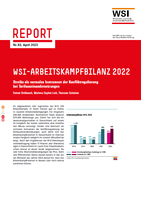 On 26 April 2023, the Hans Böckler Foundation presented its labour disputes report for 2022, based on trade union data and media reports. High inflation rates have significantly intensified the conflicts concerning the distribution of wealth, while at the same time, the increasing shortage of skilled workers has reinforced the bargaining position of trade unions. The report describes selected examples of strikes in Germany, including Amazon, the seaports and the wind turbine manufacturer Vestas. A chapter is devoted to strike action in the UK, where 2022 saw the largest wave of strikes since the late 1980s, and France, with massive protests against the raising of the retirement age. In international strike statistics comparing annual days lost between 2012 and 2021, Germany ranks in the lower midfield with 18 days per 1,000 workers. The leader is Belgium with 96 strike days, followed by France. Strikes are the absolute exception in Austria, Switzerland and Slovakia. The European Trade Union Institute (ETUI) had presented its own European report on strikes in March 2023.
On 26 April 2023, the Hans Böckler Foundation presented its labour disputes report for 2022, based on trade union data and media reports. High inflation rates have significantly intensified the conflicts concerning the distribution of wealth, while at the same time, the increasing shortage of skilled workers has reinforced the bargaining position of trade unions. The report describes selected examples of strikes in Germany, including Amazon, the seaports and the wind turbine manufacturer Vestas. A chapter is devoted to strike action in the UK, where 2022 saw the largest wave of strikes since the late 1980s, and France, with massive protests against the raising of the retirement age. In international strike statistics comparing annual days lost between 2012 and 2021, Germany ranks in the lower midfield with 18 days per 1,000 workers. The leader is Belgium with 96 strike days, followed by France. Strikes are the absolute exception in Austria, Switzerland and Slovakia. The European Trade Union Institute (ETUI) had presented its own European report on strikes in March 2023.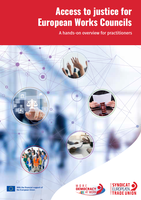 On 9 May 2023, the European Trade Union Confederation (ETUC) published a guide for European works councils which are contemplating taking legal action. There may be legal and practical obstacles to doing so, which vary widely from country to country: Does the EWC have its own legal personality? Can the EWC itself go to court or only individual members or a trade union? Can interim injunctions be granted in EWC disputes? What costs are incurred and by whom can they be borne? What are the alternative methods for resolving disputes in EWC cases? These questions are highly sensitive because there are many shortcomings in the access to justice, as the European Commission had pointed out in May 2018 (see
On 9 May 2023, the European Trade Union Confederation (ETUC) published a guide for European works councils which are contemplating taking legal action. There may be legal and practical obstacles to doing so, which vary widely from country to country: Does the EWC have its own legal personality? Can the EWC itself go to court or only individual members or a trade union? Can interim injunctions be granted in EWC disputes? What costs are incurred and by whom can they be borne? What are the alternative methods for resolving disputes in EWC cases? These questions are highly sensitive because there are many shortcomings in the access to justice, as the European Commission had pointed out in May 2018 (see  On 9 May 2023, another volume of the series “Research from Hans Böckler Foundation” was published, which deals with corporate social responsibility and the instruments for enforcing labour and social standards along global supply chains. This includes international framework agreements concluded between trade unions and multinational companies, but also supply chain laws, CSR guidelines and digital tools. The authors attach great importance to employee involvement (Workers' Voice), one chapter talks about “participation as risk management” for companies. Since January 2023, the Supply Chain Due Diligence Act has been in force in Germany aimed at safeguarding the protection of human rights, the prohibition of child labour and forced labour as well as environmental protection in supply chains. An expert report on the role of works councils was recently published (see
On 9 May 2023, another volume of the series “Research from Hans Böckler Foundation” was published, which deals with corporate social responsibility and the instruments for enforcing labour and social standards along global supply chains. This includes international framework agreements concluded between trade unions and multinational companies, but also supply chain laws, CSR guidelines and digital tools. The authors attach great importance to employee involvement (Workers' Voice), one chapter talks about “participation as risk management” for companies. Since January 2023, the Supply Chain Due Diligence Act has been in force in Germany aimed at safeguarding the protection of human rights, the prohibition of child labour and forced labour as well as environmental protection in supply chains. An expert report on the role of works councils was recently published (see  From 27 to 30 March 2023, a meeting of Roche European Forum (REF) was held in Basel in person for the first time since the start of the Corona pandemic. The EWC Academy delivered a training session during the meeting that covered fundamental topics, such as introduction of new methods of communication and improving cooperation within the REF. One can hereby draw on the past experience of working “virtually” gained during the pandemic. The Roche European Forum operates on the basis of a “voluntary” EWC agreement which does not yet meet standards of information and consultation of the 2009 Directive.
From 27 to 30 March 2023, a meeting of Roche European Forum (REF) was held in Basel in person for the first time since the start of the Corona pandemic. The EWC Academy delivered a training session during the meeting that covered fundamental topics, such as introduction of new methods of communication and improving cooperation within the REF. One can hereby draw on the past experience of working “virtually” gained during the pandemic. The Roche European Forum operates on the basis of a “voluntary” EWC agreement which does not yet meet standards of information and consultation of the 2009 Directive.
 On 13 June 2023, the EWC Academy held a video training session for the EWC of Bausch + Lomb, which has integrated many new members since the new term of office. The most important countries are Ireland and Germany, where production sites for contact lenses and ophthalmic medicines are located. Since Brexit, the EWC is no longer governed by British but by Irish law. The EWC Academy had already advised the EWC on earlier occasions, on consequences of an acquisition, for example (see
On 13 June 2023, the EWC Academy held a video training session for the EWC of Bausch + Lomb, which has integrated many new members since the new term of office. The most important countries are Ireland and Germany, where production sites for contact lenses and ophthalmic medicines are located. Since Brexit, the EWC is no longer governed by British but by Irish law. The EWC Academy had already advised the EWC on earlier occasions, on consequences of an acquisition, for example (see  From 14 to 17 November 2023 our legal seminar on EWC law will take place for the first time since the Corona pandemic, this time in Bremerhaven. It will cover the legal intricacies of an EWC agreement, current case law and the application of EU standards in cases of legal doubt. One of the speakers is Ralf-Peter Hayen, former head of department at the DGB head office and author of a legal commentary on the German EWC law (see
From 14 to 17 November 2023 our legal seminar on EWC law will take place for the first time since the Corona pandemic, this time in Bremerhaven. It will cover the legal intricacies of an EWC agreement, current case law and the application of EU standards in cases of legal doubt. One of the speakers is Ralf-Peter Hayen, former head of department at the DGB head office and author of a legal commentary on the German EWC law (see  A data protection seminar will be held in Bremerhaven from 14 to 17 November 2023. The focus will be on the EU's General Data Protection Regulation, which has been in force since 2018. Since then, the rules for processing personal data have been fixed at a uniform level throughout all EU countries. In addition to data protection, this seminar will also cover the implementation of the Supply Chain Due Diligence Act.
A data protection seminar will be held in Bremerhaven from 14 to 17 November 2023. The focus will be on the EU's General Data Protection Regulation, which has been in force since 2018. Since then, the rules for processing personal data have been fixed at a uniform level throughout all EU countries. In addition to data protection, this seminar will also cover the implementation of the Supply Chain Due Diligence Act. The next Hamburg conference will take place on 29 and 30 January 2024. As always, the latest developments in the EWC and SE landscape, case studies (“best practice”) from some companies and current court decisions will be presented. This time the focus of the conference will be on the ongoing developments for the revision of the EWC Directive. The European Commission announced on 1 March 2023 that it would start a legislative process for a new EWC Directive before the end of 2023. The programme of the conference will be available after the summer break.
The next Hamburg conference will take place on 29 and 30 January 2024. As always, the latest developments in the EWC and SE landscape, case studies (“best practice”) from some companies and current court decisions will be presented. This time the focus of the conference will be on the ongoing developments for the revision of the EWC Directive. The European Commission announced on 1 March 2023 that it would start a legislative process for a new EWC Directive before the end of 2023. The programme of the conference will be available after the summer break. The annual introductory seminar for members of European works councils, SE works councils and special negotiating bodies will again be held in Montabaur from 2 to 5 April 2024. The castle is located right next to the high-speed railway station halfway between Frankfurt and Cologne. Several seminar modules are offered for both beginners as well as advanced participants.
The annual introductory seminar for members of European works councils, SE works councils and special negotiating bodies will again be held in Montabaur from 2 to 5 April 2024. The castle is located right next to the high-speed railway station halfway between Frankfurt and Cologne. Several seminar modules are offered for both beginners as well as advanced participants.